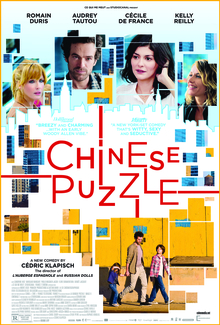This is the final installment of the trilogy that began with L’Auberge Espagnole and this time Xavier’s adventures in life brings him to New York. There are many film trilogies of course but it’s hard to think of many that are about the lives of the same group of people over real time, the best known example being of course the Before trilogy. This one is unfortunately nowhere as great but the sentiment of passing time as we watch the aging actors play familiar characters remains a powerful one. This last film is particularly good as well, comparable to the first one and far better than the forgettable second one.
Ten years and two children later, Xavier and Wendy’s marriage is in trouble. After he donates sperm to impregnate Isabelle who wants to have a baby with her new partner Ju, a Chinese American, Wendy asks for a divorce and moves to New York with the children to be with an American man. Xavier eventually decides to go there as well in order to have a relationship with his children, despite not having a residence permit or a job in the US. Ju helps him get an apartment in New York’s Chinatown and he gets by doing odd jobs, despite being a moderately successful novelist by now. After he helps a Chinese taxi driver who is assaulted, he marries his niece just to be allowed to stay in the US though this does mean that they have to put up an act to convince the authorities that the marriage is genuine. Meanwhile various people stop by to meet Xavier including his estranged father and his former girlfriend, Martine.
The first two films were niche, low budget affairs that looked cheaply made with flat lighting. This one is probably just as niche but it does finally look like it was made on a professional budget and thus captures a vibrant, great looking New York. It takes great delight in showing off the city’s skyline from the roof the flat Xavier lives in and its Chinatown. I also like how there is even some effort to show that the city is made up of many neighborhoods and convey an idea of the distances between them. It really is kind of extraordinary how this French film is so good at featuring the quintessential American city. On the other hand, while Chinese culture features prominently in the title, the film uses it only shallowly as part of the background imagery. None of the Chinese characters are really important as it is still Xavier’s friends from back when he was in Spain who are the main characters. Martine’s attempt to speak Mandarin is tortuous but I suppose it is one way to add some comedy.
Now that we’ve seen the entire trilogy, it’s more evident than ever how the whole thing is a kind of joyful celebration of cultural diversity. The conjunction of cultures and lifestyles is as messy, snarled up and chaotic as Xavier’s life but to director Cédric Klapisch, that’s all good. It feels a little silly that he has to go back to a poor student-type of existence when he has lived in Paris and London as those aren’t exactly cheap cities but that’s one way to include illegal immigrants in the US as part of the story. In Klapisch’s world, this kind of cosmopolitan, cross border lifestyle is something unabashedly wonderful and I like how featuring Chinese culture here is both a tacit acknowledgment of China’s growing prominence and declaring that this too is a welcome part of the mix. This film predates the Trump era of course but still makes for a bold repudiation of closed borders, narrowly-defined identities and nationalism. Xavier happily becomes an American in order to be with his children but that doesn’t mean he is any less French. The implication is that if in the future, his path towards happiness requires further adaptation and learning then so be it.
Still, as much as I appreciate how Klapisch has a clear vision for a trilogy that has spanned over a decade and it does feel extra meaningful to use the same cast throughout, this is not that great a film. The finale is cheesy in how old-fashioned it is and the film tends to gloss over some of the difficulties of upending your whole life to move to somewhere new. All of the children here are also remarkably well-behaved and understanding of their parents’ messy relationships. But between the improved production quality and the characters’ aging as a secondary theme, this is a solidly good film that is worth watching on its own merits and so far better than the mediocre second one. I just wish that more artists arise to champion this ideal of a globalized, borderless and interconnected world.
